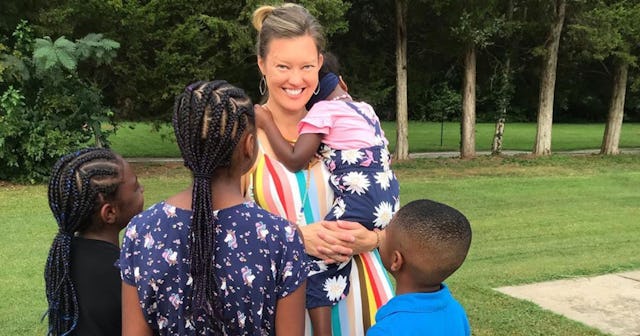My Kids Are Adopted--And Yes, They Are My 'Real' Children

I’m chatting with a fellow mom at our local park. We don’t know each other’s names, but a few of our kids are side-by-side on the swing set. We start by asking all the general mom questions—like our kids’ ages and grade levels—and also about the amazing weather.
Sometimes I prefer to talk to no one, relishing in the moments when no one is requesting a snack or help in the bathroom. I sit on a bench in the sunshine, scrolling through social media and sipping coffee. But today I’m feeling more extroverted. It’s going well until the mom decides to disrupt the positive vibes and ask me the question that irks me the most.
She smiles at my son who runs past us, playing tag with another kid he’s just met. I smile too, noting aloud how friendly and enthusiastic he is. Then she clears her throat and asks me, “So, are your kids real siblings?”
Suddenly, in that moment, I’m no longer feeling friendly. The “real” questions—like am I my kids’ “real” mom, are my kids “real” siblings, or why did their “real parents give them up for adoption”—are offensive, inappropriate, and downright intrusive. Not to mention, these are often asked in the presence of my children—who, newsflash, have eyes and ears and feelings.
I am absolutely unashamed of my big, multiracial family—the family we intentionally built through the process of domestic, infant adoption. We are proud of who we are. Our kids know they were adopted—and they are well-aware of their personal adoption stories. But those stories are sacred, and they aren’t the business of random strangers we meet at the park, the airport, the restaurant, or the store.
Their stories overlap with ours. Because adoption started with me and my husband. We had been married four years when I was diagnosed with an autoimmune disease that could make pregnancy difficult, if not dangerous. I knew early on that we would adopt.
Our first child came to us after 14 months of waiting. I remember the first time we took our newborn, black daughter to the mall—killing time while we waited for permission to leave Missouri and return to our home in another state. We were stopped by multiple people who noticed the tiny baby nestled against my chest in the carrier—all of them seeking a peek. Imagine their surprise when I moved the fabric to the side and they realized the baby wasn’t white. Rather, she had a full head of black, curly hair and chocolate brown skin.
The adoption questions started then, and they haven’t stopped. Here we are, 11 years and four kids later. The bigger our family has grown, the more questions we receive. When we walk into a public space—we are noticed.
We’re often met with second glances, smiles and nods, and even a kind, “You have a beautiful family.” Then there are those who make a beeline for us, determined to fire away their burning questions. What country are your kids from? The U.S., Missouri specifically. Are you a foster parent? No. Do your kids see their biological families? Yes, they do. Why couldn’t you have your own kids? These are my own kids. Now that you’ve adopted, are you going to try to have a baby? Nope. How much did your kids cost? We paid for an adoption process—not children.
We’re also met with compliments-of-sorts, some problematic but always well-intentioned. God bless you for adopting children who need a loving home. Your kids are so lucky to have you as their mom. It takes a special person to care for another person’s child.
None of these bother me nearly as much as the questions pertaining to my family’s realness, our authenticity. No, we don’t share the same race. No, we don’t share DNA. No, I didn’t birth my children. No, adoption isn’t second best. But yes, we are absolutely a real family—comprised of real parents and real siblings—who really love each other.
I know—it’s very hard for people outside of the adoption realm to grasp. They can’t imagine missing out on pregnancy, gender reveal parties, child birth, and baby showers. I don’t see physical resemblances between myself and my kids. I didn’t give birth to them. My son isn’t named Steve Jr. after his dad. But that doesn’t make my kids less than what they are—my real kids.
You see, real love is about relationship. After all, I’m guessing you aren’t biologically related to your partner—but the love you share is legit. It’s no more or less real, because you don’t share strands of DNA.
I’ve had people ask me if there’s a less offensive way to ask about our realness—and the answer is, no. I mean, I’m not crying buckets of tears when someone asks me for the fourth time in a week if my kids are real siblings. However, I’m certainly not willing to dish my family’s details to someone who ignorantly assumes that we are somehow less-than because adoption built our family.
If you happen to see a family who looks like mine, you may have questions. The desire to connect with other people isn’t wrong in and of itself. But please, don’t interrogate us out of your personal need-to-know. I’m totally cool answering general adoption questions—but I draw the line at demands and rudeness.
I’m not going to ask you to share your weight, income, religion, or sex life with me. Likewise, please don’t ask me to justify our authenticity as a family to you. Now if you’ll excuse me, I have children to raise.
This article was originally published on